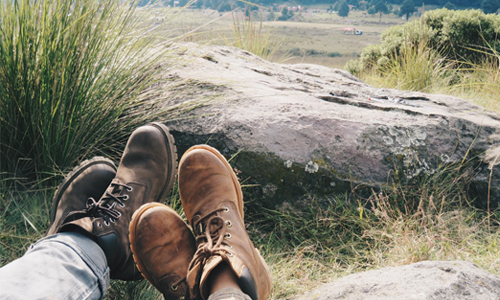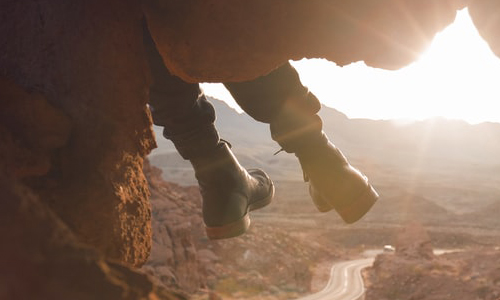Tips to Avoid Injury While Hiking
Author

A keen runner, skier and nuts about cycling. Karl lives in Cumbria, where he loves encouraging his two children to follow in his outdoor lifestyle. Whilst out and about keeping active, Karl keeps a diary and shares it with Outdoor Look.
When we read about hiking, it seems like a low-risk activity which only only requires you to walk through different terrains. But hiking is so much more. It is a natural form of exercise and a way to build your relationship with nature. The only problem is that nature is very unpredictable.
Because of the frequent shift in weather conditions, hiking might become difficult. It might get harder with injuries if they are not taken proper care of. The worst-case scenario would be spinal injury or even death.
There are many ways with which you can avoid sustaining injuries while hiking. Here are some of them:

Walking poles
If you are new to the whole hiking game, it is likely for you to lose balance. With harsh weather and a steep incline in front of you, it might not be a safe idea to go hiking. However, walking poles are a major help while you are learning to hike steep inclinations. These are also useful for endurance and help take some weight and strain off your legs.
Stop and rest
Hiking can be quite tough if you are not an endurance hiker. It might also take you a long time with continuous hiking. You might get drained after a long day if this continues. It is advisable to have rest during pit stops and make it less rushed and more enjoyable. You might take a break to soak in the beauty of nature.
Store essentials
With a long arduous journey, you might get hungry. You burn a lot of calories while hiking, and it is important to keep yourself hydrated at all times. Even when you are hydrated, you might feel nauseous because of improper nutrition. You can bring lightweight calorie-dense food and ample water to keep you hydrated during the entire session.
Wear proper hiking gear
To avoid cuts, injures, and insect bites, always make sure to put on a long-sleeved T-shirt/top and trousers. Hiking trousers are comfortable to wear and are durable. They also provide comfort and adjustability. It is beneficial for you to wear long-sleeved clothes to avoid bruises and cuts along the way.
Train before hiking
Some of the most common injuries are suffered because of lack of training. Training is an important element of hiking. You can perform well if you start with short hiking trails/routes until you have built your endurance. You can also strengthen your muscles through constant training and with time, you would get better at hiking long trails/tracks.
Pack insect repellent
One of the most common issues while hiking has been insect bites and bruises. It is safer to avoid such mishaps by taking care of them. Pack your essentials along with an insect repellent and make sure to use it while you are hiking. If you are hiking during the rainy season, expect cuts and bruises due to difficult terrain and insects. As they say, prevention is better than cure.
Add a first-aid kit to your list
A first-aid kit can help you in the long run. If you are hiking in high-steeped mountains, you should be aware of the climatic conditions. Whenever there is a minor injury, it is better to use the first-aid kit. A first-aid kit should include antiseptic, bandages, sugar sachets, insect-repellent, electrolyte powders, etc.

Going on a hiking spree?
Explore more such safety measures before going on a hike. Wear your sleeves right, store your essentials, and don’t forget to put on sunscreen. Once you have ticked off your checklist, it is time to enjoy your hike.
Author

A keen runner, skier and nuts about cycling. Karl lives in Cumbria, where he loves encouraging his two children to follow in his outdoor lifestyle. Whilst out and about keeping active, Karl keeps a diary and shares it with Outdoor Look.
Categories
- Sport (28)
- Product Reviews (3)
- Team Outdoor Look (7)
- Mike Wild (2)
- Mike Payton (2)
- Suse Hammond-Pears (3)
- Snowboarding (12)
- Latest Offers (105)
- Shop Talk (1)
- Competitions (7)
- Walking (413)
- Lifestyle Fashion (8)
- Travel (86)
- Kit Guides (176)
- Workwear Clothing (6)
- Safety Workwear (4)
- Health/Fitness (289)
- Skiing (91)
- Great Outdoors (1316)
- Cycling (92)
- January 2025
- December 2024
- November 2024
- October 2024
- September 2024
- August 2024
- July 2024
- June 2024
- May 2024
- April 2024
- March 2024
- February 2024
- January 2024
- December 2023
- November 2023
- October 2023
- September 2023
- August 2023
- July 2023
- June 2023
- May 2023
- April 2023
- March 2023
- February 2023
- January 2023
- December 2022
- November 2022
- October 2022
- September 2022
- August 2022
- July 2022
- June 2022
- May 2022
- April 2022
- March 2022
- February 2022
- January 2022
- December 2021
- November 2021
- October 2021
- September 2021
- August 2021
- July 2021
- June 2021
- May 2021
- April 2021
- March 2021
- February 2021
- January 2021
- December 2020
- November 2020
- October 2020
- September 2020
- August 2020
- July 2020
- June 2020
- May 2020
- April 2020
- March 2020
- February 2020
- January 2020
- December 2019
- November 2019
- October 2019
- September 2019
- August 2019
- July 2019
- June 2019
- May 2019
- April 2019
- March 2019
- February 2019
- January 2019
- December 2018
- November 2018
- October 2018
- September 2018
- August 2018
- July 2018
- June 2018
- May 2018
- April 2018
- March 2018
- February 2018
- January 2018
- December 2017
- November 2017
- October 2017
- September 2017
- August 2017
- July 2017
- June 2017
- May 2017
- April 2017
- March 2017
- February 2017
- January 2017
- December 2016
- November 2016
- October 2016
- September 2016
- August 2016
- July 2016
- June 2016
- May 2016
- April 2016
- March 2016
- February 2016
- January 2016
- December 2015
- November 2015
- October 2015
- September 2015
- August 2015
- July 2015
- June 2015
- May 2015
- April 2015
- March 2015
- February 2015
- January 2015
- December 2014
- November 2014
- October 2014
- September 2014
- August 2014
- July 2014
- June 2014
- May 2014
- April 2014
- March 2014
- February 2014
- January 2014
- December 2013
- November 2013
- October 2013
- September 2013
- August 2013
- July 2013
- June 2013
- May 2013
- April 2013
- March 2013
- February 2013
- January 2013
- December 2012
- November 2012
- October 2012
- September 2012
- August 2012
- July 2012
- June 2012
- May 2012
- April 2012
- March 2012
- February 2012
- January 2012
- December 2011
- November 2011
- October 2011
- September 2011
- August 2011
- May 2010
- April 2010
- March 2010
- February 2010
- January 2010
- November 2009
- October 2009
- September 2009


Submit a Comment